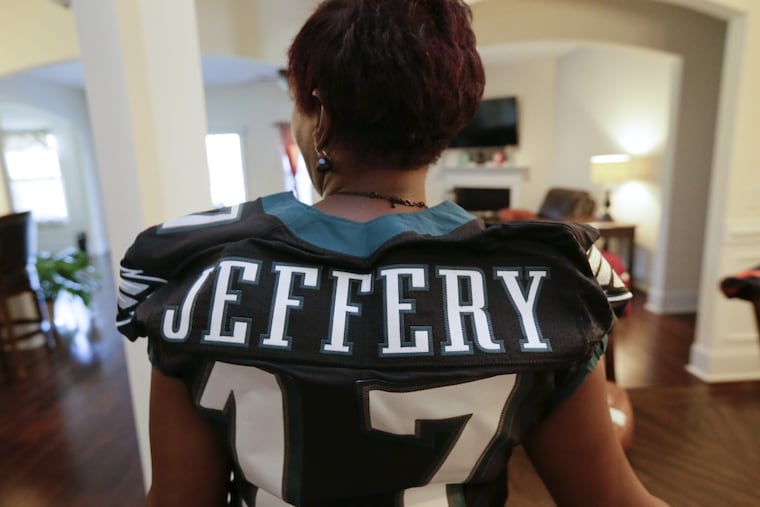The Eagles' strategy to win the Super Bowl was smart, and they're sticking to it | Mike Sielski
Alshon Jeffery's signing was the consummate example of the Eagles' approach: pursuing high-character veterans at a time when young players are valued more. They're still using that approach as free agency begins.

At the kitchen table in the Gaston, S.C., home that her son had built for her, Deloris Jeffery confessed to the concern that any mother of any NFL player might feel, and that she felt for her son Alshon. This was Saturday, Aug. 19. Three weeks earlier, during an Eagles training-camp drill, Alshon Jeffery had fallen hard on his right shoulder. From that moment through the rest of the preseason, he played little and practiced less. He had not played a full 16-game season, in fact, in three years, and Deloris was asked how much she worried about his health, particularly given that he had signed for just one year with the Eagles, that he was banking on a big season to earn a long-term contract.
"A little," she said. "But you know what? He doesn't call and say, 'Mom, I'm hurt.' Somebody else always tells me he's hurt. I know if he gets hurt real bad, he'll call me. But he likes to be strong."
He was strong enough, it turned out, to suit up for all of the Eagles' 19 games, to catch two touchdowns in the NFC championship game, to stretch his arms high to catch another in Super Bowl LII – all with a torn rotator cuff, all as the best example of a cagey personnel strategy that has the Eagles out ahead of the rest of the NFL.
With the league's free-agency period officially starting Wednesday, an annual tradition has begun anew: the attention that fans and media pay to who signs where for what dollar amount, to the talent that each team accumulates or relinquishes, to the creative accounting and out-and-out rewriting of contracts that executives do to keep their rosters under the salary cap. Howie Roseman and his staff are better at that financial management and manipulation than most. But focusing just on their ability to create cap space – and they did it again Tuesday, restructuring Lane Johnson's contract – misses the vital advantage that the Eagles have already exploited.
At a time when franchises value the flexibility that comes with a hoard of draft picks and the cost-effectiveness that comes with a young roster, the Eagles won a championship by targeting a market inefficiency: veteran players of high football character. Over the last decade-plus, the NFL has gotten younger and less experienced; according to the research firm Football Outsiders, the average age of a player who saw significant playing time fell from 27.2 in 2006 to 26.6 in 2015, the lowest mark of that 10-year period. There was a potential edge to be gained, then, by acquiring older, more experienced players, provided that the franchise already had a talented quarterback still on his rookie contract – and in Carson Wentz, the Eagles did – and provided that those players were willing to fit seamlessly into a team-first environment and culture.
Roseman found such men last year to upgrade the Eagles' starting lineup and to add depth — Jeffery, Torrey Smith, Nick Foles, Chris Long, LeGarrette Blount, Patrick Robinson, Corey Graham — and he appears on the hunt for them again this year. Their reported targets, on both the free-agency and trade markets, have included defensive tackle Haloti Ngata, 34, and Michael Bennett, 32, and though Bennett's personality has been rather mercurial throughout his career, it's reasonable to think that the presences of Malcolm Jenkins, Long, and others in the locker room will help to keep any disruptive instincts in check.
The Eagles have earned that benefit of the doubt, and you can trace the rise in their credibility to their decision to pursue and land Jeffery. Between Joe Douglas, who spent 2015 in the Bears' front office, and Mike Groh, who had been Jeffery's wide-receivers coach in Chicago from 2013-15 and was his position coach again here, the Eagles were familiar enough with Jeffery to trust that his injury-riddled recent history and his four-game suspension in 2016 for PED use weren't necessarily true and complete reflections of his character.
Their educated guess was right. From his raw regular-season statistics – 57 receptions, 789 yards – Jeffery would seem to have had a mediocre season, especially for a No. 1 wide receiver. But considering the pain that he played through, he did more than enough to justify the four-year deal, worth as much as $52 million, that he and the Eagles agreed to in December. And if you want to argue that he tolerated the injury for selfish reasons, that he did so only to get paid, just remember that he saved his finest football for the two final, and most important, games of the season, after he had already signed his extension.
"I wasn't surprised," Jeffery's cousin Barry Charley said in a phone interview Tuesday. "That's the type of person he is. That's just Alshon."
That's also the way the Eagles do business now, and there's never been less reason for concern about how they do it, or why, or what it might lead to. It won them their first Super Bowl. The challenge now is to win another before everyone else catches up.
[Relive the Eagles' Super Bowl championship season with our limited edition commemorative book]